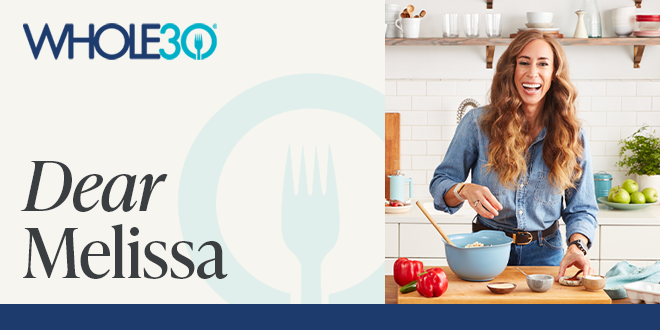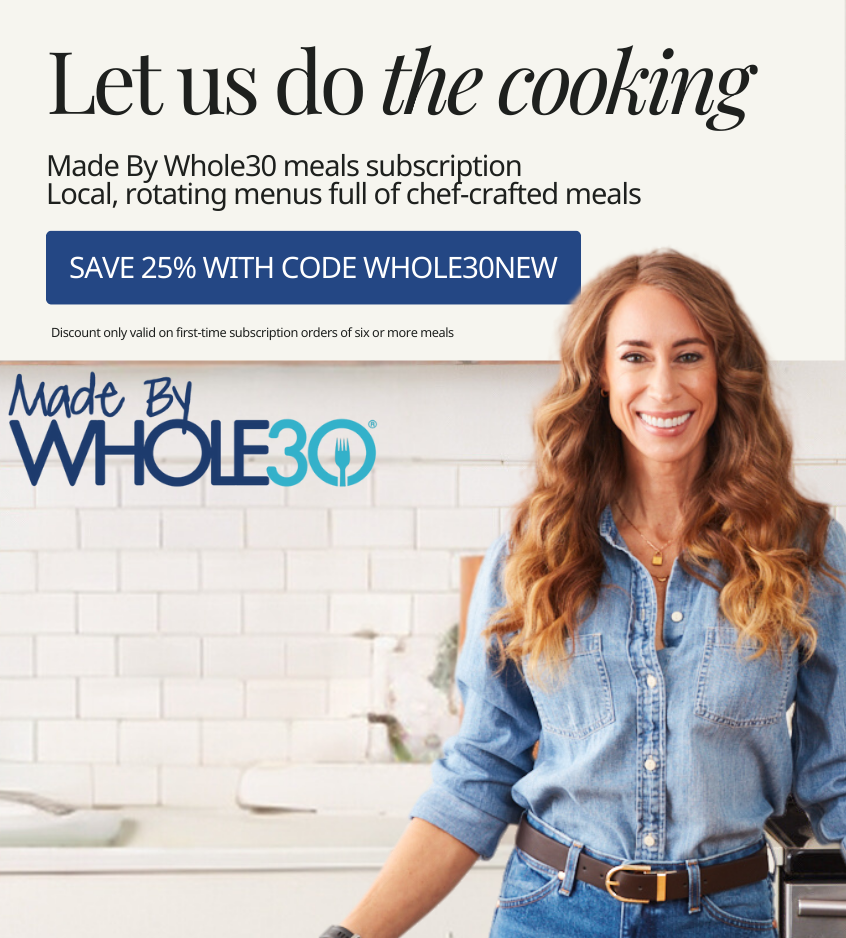I did the very first Whole30 in April 2009, before the program even had a name. It was supposed to be a fun self-experiment where I’d eliminate potentially inflammatory foods for a month and see if anything improved. The idea (put forth by prominent researchers at the time) was that some of the foods we’d been sold as universally healthy, like whole grains, low-fat dairy, and sugar substitutes, may be having a negative effect on your cravings, metabolism, digestion, and immune system. After attending a nutrition seminar on the topic, my training partner and I decided to remove these foods for a month, super-strict, to see what happened.
At the time, I was highly focused on my athletic performance. I had just celebrated nine years free from my drug addiction, and my fitness routine had become a regular, grounding practice in my recovery. I took on this dietary change specifically to see if it would make me stronger, or recover faster, but I didn’t have high expectations. I already ate well and felt good, so I didn’t expect it would be, like, magical or anything.
Cue the narrator: Things were, in fact, about to get magical.
My first Whole30
Over the next 30 days, I eliminated added sugar, grains, dairy, beans, soy, peanuts, and alcohol. For the first time in forever, I wasn’t counting calories or limiting my portions—if anything, I was eating more than I had before, because I ditched protein shakes and fat-free snack packs for healthy fats and real food. I really missed my Dunkin Donuts iced caramel lattes, but I learned to drink my coffee black; replaced my morning bagel with eggs, avocado, and salsa; and started brewing a pot of herbal tea after dinner instead of automatically reaching for dessert.
Around Day 14, I woke up feeling like the Energizer bunny. I had boundless energy from the moment I woke up until I went to bed—no more 2 PM slump. I was sleeping so much better, so I’d spring out of bed annoyingly chipper at 5 AM for the gym. I was faster and stronger in my workouts. Even my mood was happier. I managed a large team of young professionals that year, and during one of our weekly meetings, one of them tentatively asked, “What have you been doing? You’re so… friendly.”
More than food
Surprisingly, the experiment also highlighted the ways that my relationship with food wasn’t as healthy as I had believed. In fact, I could see for the first time how I was using food the way I used to use drugs—to self-soothe, to numb, or to distract myself from discomfort or anxiety. Because the foods and drinks I relied on to cope weren’t available, I was forced to find other ways to sit with my feelings. I started journaling again, I talked to friends and family, I went on more walks, and I replaced a glass of wine with meal prep, blogging, and tidying as stress relief.
But the biggest benefit—as if all of that wasn’t powerful enough—was realizing a week after my Whole30 was “over” that I hadn’t stepped on the scale in weeks. I also realized that I hadn’t been scrutinizing myself in the mirror, picking myself apart or speaking negatively about my body either. Despite having a societally approved body type, I still wrestled with my body image, and (in part because of my history of trauma) struggled to feel connected to my body. Before my Whole30, I weighed myself daily, spoke negatively to myself regularly, and didn’t know how to listen to cues from my body—you’re hungry, you’re tired, you need a rest day.
The Whole30 was the first time I had ever gotten off the scale and out of the mirror—and I wasn’t going back. My relationship with food had dramatically transformed. I felt better than I had ever felt before. I was eating whatever I wanted without cutting or counting calories, was more connected to my body, and didn’t miss the foods and drinks I had discovered don’t work well for me. And my fixation with the scale and the mirror just… disappeared. More than all of that, though (I’m not done!), the Whole30 gave me the energy and self-confidence to ask, “What else could I do?”
Not in the way you might imagine, though.
Looking in, not out
It might seem a natural progression to use that extra energy and confidence to step up my CrossFit workouts, start training for a marathon, or start taking tennis lessons… but for the first time in my whole life, I turned that energy inward. The Whole30 had shown me that I could trust myself—that I could trust the signals my body was sending me, and that I knew better than any diet or health guru what worked for ME. So I used that energy to ask myself what else I needed, how best to care for myself, what else I could do to be in partnership with my body.
Over the next few years (and a few more Whole30s), I would cut back on my workouts, eventually opting out of high-intensity exercise altogether in favor of more mobility, strength work, and hiking. I continued to experiment with my diet, reintroducing carefully after each Whole30 to better dial in what made me feel my best and brought me the most joy. (I started eating Cadbury Crème Eggs and hot buttered popcorn again, but cut way back on my alcohol consumption and stopped eating cheese entirely.) I left my 10-year career to pursue my dream and work on Whole30 full-time, writing my first book just a year later.
I also started going deeper in my therapy sessions, unpacking the things I needed to finally forgive myself for my addiction. And except for one brief time period—when I was newly pregnant, and struggling anew with my changing body—I felt truly free from the scale and the mirror. (Still, I had the tools to navigate that phase with grace, and without falling back into old habits.)
What will your Whole30 bring?
My first Whole30 experience will not be yours—not exactly. But I have heard from thousands of people over the last 13 years who have said they started the Whole30 for one simple reason (a reduction in pain, more energy, less bloating, fewer migraines) and discovered so much more in the program. Yes, they had more energy, slept better, had fewer cravings and smoother digestion, and saw an improvement in their allergies, asthma, migraines, anxiety, and chronic pain. But they also ended unhealthy relationships, went back to school, quit toxic jobs, moved to their dream cities, asked for (and received) raises, ran marathons, founded businesses, and booked bucket-list trips.
More than that, your Whole30 has the power, as it did for me, to break you free from the shackles of a weight loss diet mindset once and for all. Just 30 days can get you off the scale and out of the mirror, trusting the signals your body is sending you, restoring a strong mind-body connection, and leaving you feeling empowered:
- Empowered to define health on your own terms
- Empowered to feed yourself in a way that you know nourishes you best
- Empowered to eschewing any health advice that doesn’t feel true or good for you
- Empowered to set boundaries to preserve your physical and mental health
- Empowered to show up in the world as your fullest self
How can you create that sense of empowerment for yourself as you navigate your next Whole30? Discover my top three tips for turning your Whole30 from “just” a 30-day dietary self-experiment to a vehicle for self-empowerment in all areas of your life. And if you’re still doubtful, that’s okay—I was too. Just give us 30 days.
XO Melissa
To have helpful Whole30 guidance and advice straight from Melissa Urban and the Whole30 HQ team, sign up for the Whole30 email list. You’ll get a variety of compatible recipes, insightful articles, and much more delivered to your inbox every week.















